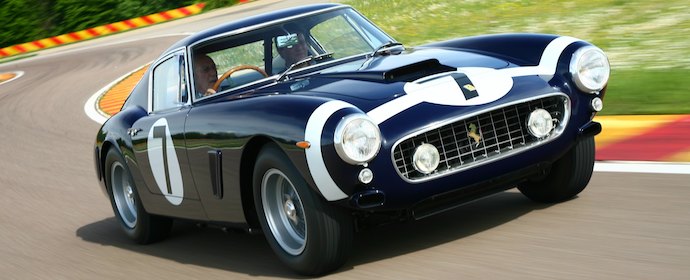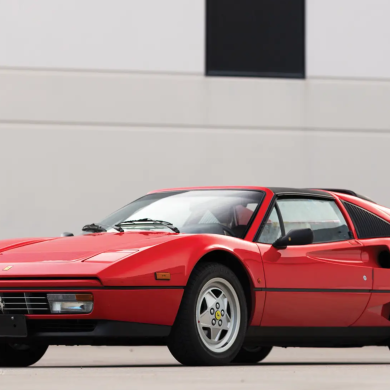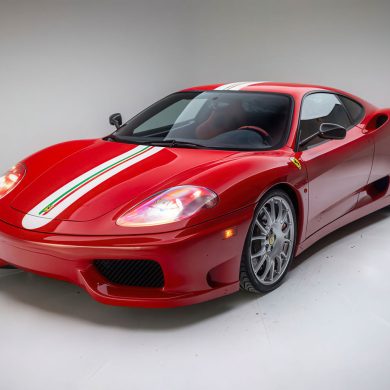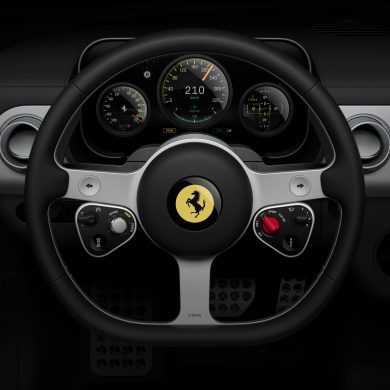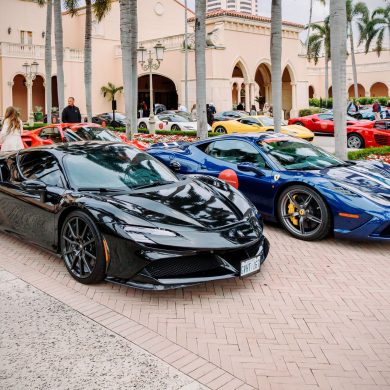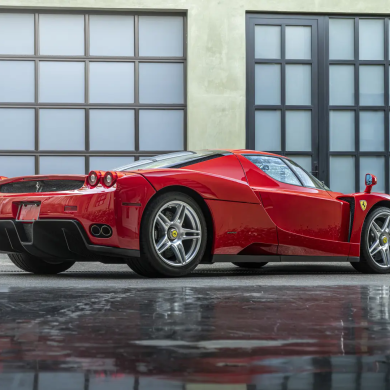At the Paris Auto Show in 1959, Ferrari closed out the decade right by unveiling their most wonderful GT to date. In the ongoing development of the 250 GT series of cars, Ferrari engineers Giotto Bizzarrini, Carlo Chiti, and Mauro Forghieri elected to shorten the wheelbase of the existing 250 GT platform by around eight inches, thus improving handling and maneuverability. The Colombo V-12 was also tweaked to give as much as 280 horsepower, and Pinin Farina was responsible for the gorgeous, purposeful fastback body. The rest, as they say, is history.The 250 GT SWBs secured race wins for the Prancing Horse around the globe and handily took the 1961 Constructors Championship in the GT class.
This featured car, chassis number 2735, is one of the most famous and recognizable 250 SWB’s of them all. The Rob Walker paint and the number 7 will forever link the car to the great Stirling Moss, who campaigned the car, quite successfully of course, in the late months of his active career.
Chassis 2735 was one of only three right-hand drive Competition short-wheelbase cars. It was also the second Rob Walker/Stirling Moss GT Berlinetta. The other was chassis 2119.
This car was also the only 250 GT Berlinetta to be raced in period by no fewer than three great drivers of the day. As well as Stirling Moss, it was raced by Graham Hill and Innes Ireland.
The car was delivered to Le Mans on the 6th of June 1961, in Rob Walker colors, but to race for NART team of Luigi Chinetti. The car weighed in at 2,400 pounds (1,107 kilograms).
Ferrari 250 GT SWB Competition, Chassis 2735 – Race History
1961 Le Mans 24 Hours:
Stirling Moss and Graham Hill. DNF, GT Lap record. Running 3rd overall in the 9th hour, well ahead of the other works prototypes until a fan blade broke loose and sheared the water pump.
1961 Silverstone International Trophy:
Stirling Moss. 1st OA, pole position and GT lap record. Moss faces the newly launched and all-conquering E-Types for the first time and beats Graham Hill, Bruce McLaren and Roy Salvadori, all driving E-Types.
1961 Brands Hatch Peco Trophy:
Stirling Moss. 1st OA, Pole Position and GT Lap record. Moss again sees off Mike Parkes in the other SWB as well as Graham Hill, Salvadori and McLaren in the E-Types.

1961 Goodwood Tourist Trophy:
Stirling Moss. 1st OA. Moss wins his 7th and last TT, defeating Parkes in an SWB as well as Jim Clark and Salvadori in Aston Martin DB4 Zagatos. Giotto Bizzarrini, who oversaw the Ferraris at the race, then drove #2735 over the Alps and back to Maranello.
1961 Nassau Tourist Trophy:
Stirling Moss. 1st OA. This is the last race Moss will win before his accident.
1962 Daytona 3 Hours Continental:
Innes Ireland. DNF. The car was now assigned to UDT-Laystall although still racing in Rob Walker colors.
1962 Oulton Park GT Race:
Innes Ireland. 4th OA, pole position. GT Lap record.

Chassis no. 2735 was the Ferrari most raced by Moss (five races out of twelve Ferrari drives) as well as the car he won the most races in. He describes it as the “best GT car in the world”.
The car was then bought by Chris Kerrison, painted silver and raced with some distinction, before crashing into the Ferrari 250 GTO of John Surtees and Jim Clark’s Aston Martin DB4 Zagato at the 1962 Goodwood Tourist Trophy. After this it was sent to Ferrari for repairs, but Kerrison then entrusted the car to Bizzarrini, who had Drogo build a pseudo-GTO body on the chassis. The car was raced at Spa, the Nurburgring, the Tour de France and many British circuits. It was later owned and raced by the Hon. Patrick Lindsay, Dick Crosthwaite and Vic Norman, among others. In 1983 the Drogo body, which had been crashed and was deteriorating, was removed by a UK specialist and replaced with new bodywork to the original Scaglietti GT Berlinetta short-wheelbase design.



In late 2007 the current owner, Clive Beecham, entrusted Ferrari Classiche with a complete body-off restoration. The car, which has a continuous, uninterrupted history had – naturally enough for a racing car – been subject to numerous repairs over the years. When stripped by Ferrari Classiche, a number of incorrect repairs to the chassis came to light, and these were rectified according to the factory’s original chassis blueprints.
The engine was totally overhauled, with a correct-specification engine block being cast by the factory to replace the non-original block that had been fitted in 1967. At the same, the original specification Weber 46s were fitted, the transmission and differential were overhauled, and all worn or non-original components repaired or replaced with original parts. Where original parts were no longer available – such as pistons and connecting rods, cam shafts, gear selector forks, aluminum riveted fuel tank and exhaust system – they were remanufactured by Ferrari Classiche using the designs from the company’s extensive archives.



In respect to the car’s provenance, Ferrari Classiche carried out a fine-tuning operation on the bodywork. All the existing body panels were retained, but a number of structural areas were rectified where modifications had been made in period when the car was rebodied by Drogo and the scuttle line lowered.
The result is a 250 GT Berlinetta that completely respects the criteria of correct technical specifications and authenticity as laid down by Ferrari, with every single component corresponding to the exact description of the car according to the build sheet when it left the factory in June 1961.


[Source: Ferrari SpA]


